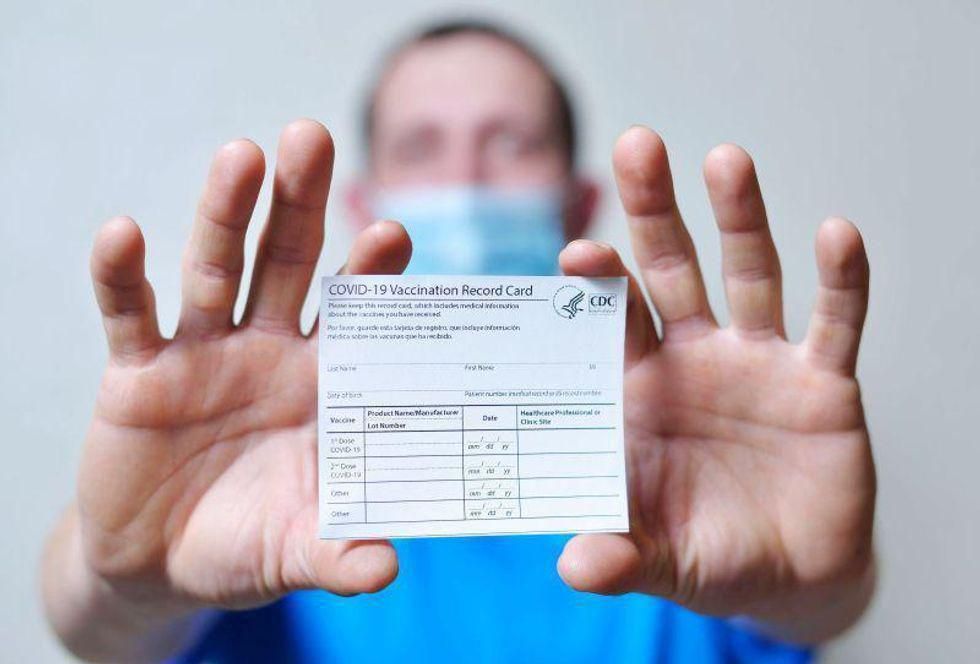
Only 20 states reached President Joe Biden’s goal to get at least one dose of a coronavirus vaccine into the arms of 70% of American adults by the Fourth of July.
White House officials first acknowledged last month that they would fall short of the goal, which was set early in May, when the United States was vaccinating people at a much faster pace than it is now.
The news is particularly troubling as fresh data from Johns Hopkins shows that COVID-19 cases are rising again as the highly contagious Delta variant spreads in states with lower vaccination rates: Those states have almost triple the rate of new cases as states with higher vaccination rates do.
“There are some states where the level of vaccination of individuals is 35% or less,” Dr. Anthony Fauci told NBC News on Sunday. “Under those circumstances, you might expect to see spikes in certain regions, in certain states, cities or countries. I don’t think you are going to be seeing anything nationwide, because fortunately we have a substantial proportion of the population vaccinated. So it’s going to be regional.”
As of Sunday, states with lower rates of vaccination reported an average of 6 new cases per 100,000 residents every day over the past week, according to Johns Hopkins. States with higher vaccination rates only reported an average of 2.2 new cases per 100,000 residents each day over the past week.
Arkansas, where less than 35% of residents are fully vaccinated, averaged 16 new cases per 100,000 residents every day over the past week. That’s about five times the nationwide rate of new cases, CNN reported.
The state is one of 10 where the rate of new cases jumped more than 25% over the past week. Of those, all but one — Delaware — had below-average vaccination rates, CNN said.
In contrast, Vermont leads the country in vaccination rates, with 66% of its residents fully vaccinated. Vermont also has the lowest rate of new COVID-19 cases — less than 1 per 100,000 residents each day over the past week, according to Johns Hopkins. That’s a decrease of nearly 16% from the previous week, CNN reported.
Meanwhile, parts of the South, Southwest and Midwest are starting to see surges, Dr. Jonathan Reiner, a professor of medicine and surgery at George Washington University, told CNN.
Florida is getting hit particularly hard, with about 17% of all new cases in the United States being reported there, he said.
As for young people who don’t think they need to get vaccinated, Reiner said his hospital has seen plenty of young adults suffering from COVID-19 or complications of long COVID months after infection.
“What I would say to young people is that COVID-19 doesn’t have to kill you to wreck your life,” he said, adding that vaccination is “the ticket to get your life back.”
J&J says its vaccine works against Delta variant
Johnson & Johnson announced last week that its coronavirus vaccine is effective against the highly contagious Delta variant that brought India to its knees this past spring.
The finding will no doubt reassure the 11 million Americans who have gotten the J&J shot, as the company also noted the protection lasted eight months after inoculation.
Although there was a slight drop in potency against the Delta variant, data from two studies show the J&J vaccine was more effective against the Delta variant than the Beta variant that first surfaced in Africa. Even better, antibodies stimulated by the J&J vaccine grew in strength over time, the company added.
Both studies, which have been submitted for online publication on the preprint server bioRxiv, were small, but the company said it released the results early because of high public interest.
“Today’s newly announced studies reinforce the ability of the Johnson & Johnson COVID-19 vaccine to help protect the health of people globally,” Dr. Paul Stoffels, vice chairman of the executive committee and chief scientific officer at Johnson & Johnson, said in a company news release. “We believe that our vaccine offers durable protection against COVID-19 and elicits neutralizing activity against the Delta variant. This adds to the robust body of clinical data supporting our single-shot vaccine’s ability to protect against multiple variants of concern.”
Still, the potential threat that the Delta variant poses even has people who are immunized worrying about whether they are protected.
In the United States, the variant now accounts for one in four new infections, The New York Times reported. Public health officials have said the vaccines authorized in the United States work against all existing variants, but the data are mostly based on studies of the Pfizer and Moderna mRNA vaccines.
And the U.S. Centers for Disease Control and Prevention’s guidance that vaccinated people could forgo masks indoors in many situations was based mostly on data for Pfizer and Moderna’s mRNA vaccines, the Times said.
Some people who were immunized with the J&J vaccine complained that they felt cheated by experts who had said the vaccines were equally good, the Times reported.
But other experts noted that the clinical trials have made it clear that the efficacy of the J&J vaccine is lower than the mRNA vaccines.
“Seventy-two percent is of course lower than 95 or 94 percent,” Florian Krammer, an immunologist at the Icahn School of Medicine at Mount Sinai in New York City, told the Times.
Data on the J&J vaccine’s potency has also been slow to arrive, because it was rolled out later and because of the pause on its use amid concerns about rare blood clots.
More information
The U.S. Centers for Disease Control and Prevention has more on COVID-19 vaccinations.
SOURCES: The New York Times; CNN; Johnson & Johnson, news release, July 1, 2021
Source: HealthDay

Leave a Reply